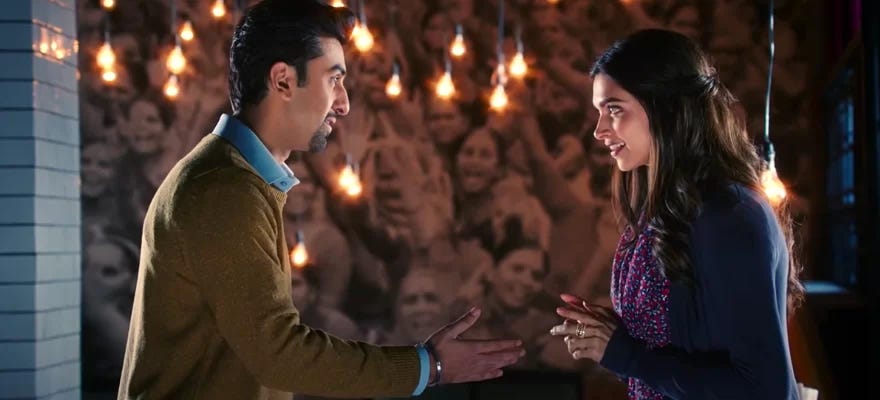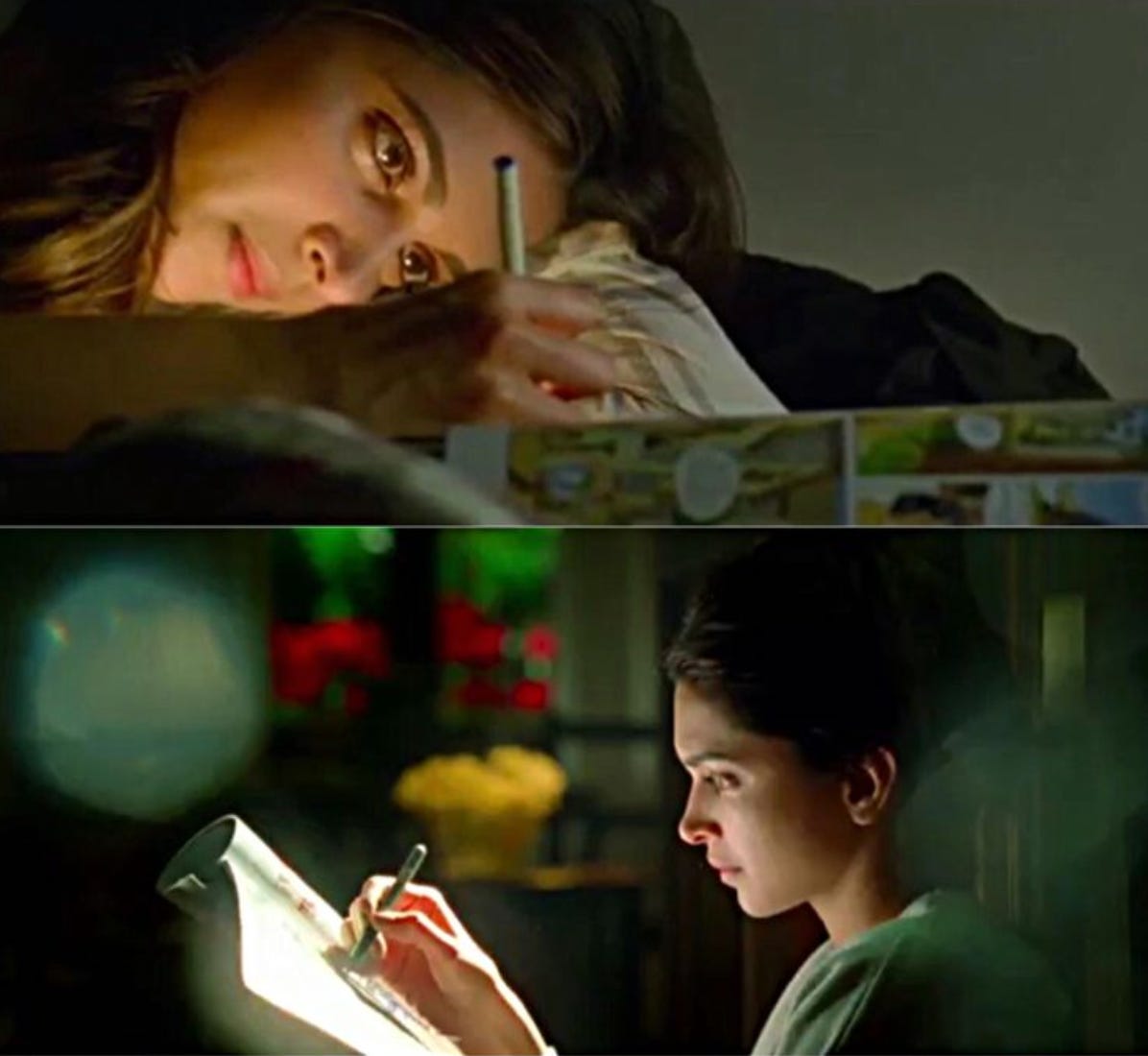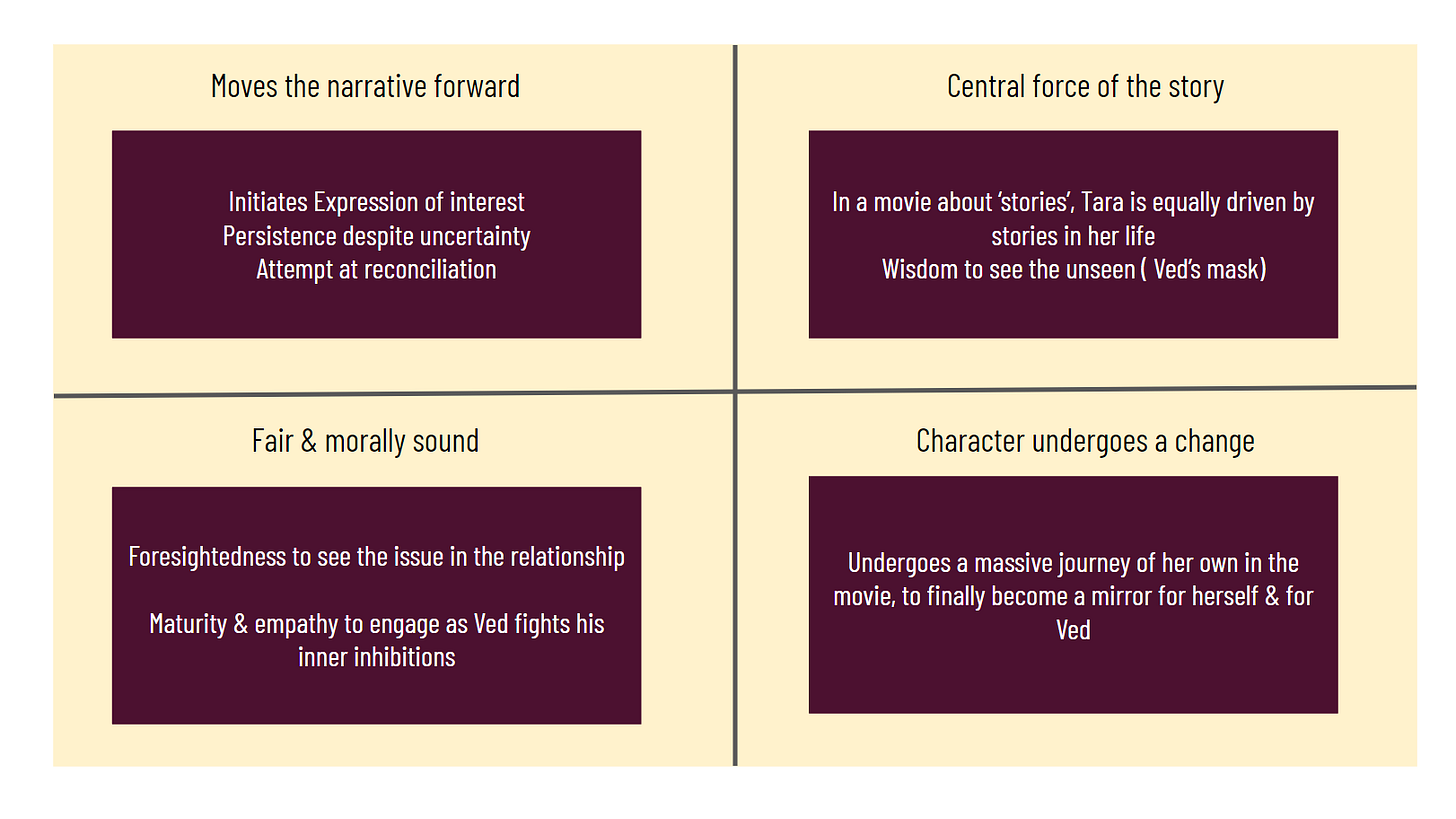Tamasha - A Tale of Tara's Safarnama
#9- A character in the cult movie - often touted as a catalyst. But maybe she is the protagonist, on her own journey, in this world of 'Stories'.
Defining a protagonist is the storyteller's prerogative. But there are a few who are perceived only as catalysts, but are true form protagonists, who are actually the driver of the narrative.
We revisit the movie Tamasha and double click on Tara, played by Deepika Padukone. The character is remembered as a catalyst in the journey of Ved ( Ranbir Kapoor).
But maybe Tamasha is Tara’s Safarnama - her bridge between the real world & the world of stories.
Time stood still as the sun was about to set. From a quaint rooftop cafe, Tara could see the sun hug the ocean at the horizon. She took a sip of her espresso followed by a tender bite of the warm, flaky croissant. Time felt so still that between two sips, her thoughts could ride back to childhood and return. She was alone, but not lonely. After all, she was living her childhood dream - an evening in the dreamy island of Corsica.
Tara was an avid Asterix fan. Her favorite was the first one she read : Asterix in Corsica. The memory of the comic is still vivid. Her father bought a second hand copy of the comic from College street near Bowbazar in her hometown Calcutta. She was ten years old then. She finished it the same day. On that sunny Sunday afternoon, while everybody else enjoyed their siesta, she sat on the edge of her grandfather’s resting chair. The resting chair squeaked everytime she moved, but it didn’t bother Tara as she flipped through each page, devouring the story. Her imagination had already transported her - To Corsica.
Reading this comic became her daily ritual. She would come home after school, finish lunch and read it start to finish. With every read, it became clear for her- she had to visit Corsica. She believed a special adventure awaits her there.
She made it a point to announce it to her parents & friends in school. Even when teachers or elders asked what she wanted to do when she grew up, she never named a profession. She stopped with just one line - I would go to Corsica.
While her parents & a few friends encouraged her, naysayers objected. They expected her to pick a stable profession- a doctor, engineer or at least mention joining Dad’s flourishing tea business. It was Tara’s first realization of the world made of two types of people- dreamers & naysayers. She loved the dreamers.
As she grew up, this realization evolved. She understood there are more naysayers than dreamers, but she also understood that extremes are not ideal. She started appreciating balance. But one thing was still the same - her commitment to travel to Corsica.
And here she is, taking a little pause before the last bite of the soft croissant & final sip of coffee, smiling by herself, slowly mouthing the words ‘ I’m here.’
__________________________________________________________________________
This is possibly how the backstory of Tara ( Deepika Padukone) would look like of how she ended up in Corsica. For those who have seen the movie Tamasha, they know what happens next. For those who haven’t, a brief synopsis here . Tara has a mishap where she loses her bag, her money & documents get stolen (‘Woh bag jo kabhi nahi ghoomna chahiye’). She is in a helpless situation, till Ved ( Ranbir Kapoor’s character) shows up. The rest of the story follows the character arc of Ved’s self discovery, how his real self is not the one he pretends to be at work, but instead the alias that he made up during the holiday. Tara acts as the catalyst - the mirror in making it happen.
So it’s Ved's journey of self-discovery.
Or is it? Or is Tamasha actually - Tara’s Safarnama?
If we flex our lens, we can see what’s unseen. Tara is the protagonist of the story, on her own journey in the world of stories. In the process, she ‘solves’ for the conflict of a loved one.
Who is a Protagonist?
The definition of protagonist in literature is quite clear.
A protagonist is a character who pushes a story forward.
He or she is also the central force of the story.
More often than not the protagonist is fair and virtuous, and is always supporting the moral good.
Further in the plot the protagonist may undergo some change, which will probably be the climax of the story.
( Source : https://literarydevices.net/protagonist/ )
Let us break down ‘Tamasha’ using the above framework :
Moves the narrative forward :
After the mishap turned happenstance, the narrative moves forward only because of Tara’s conviction & choices- her expression of fondness for Ved, her realization of what’s amiss without this ‘sense of adventure’ were key to push the narrative forward. She persisted through ‘ uncertain evenings’ at the cafe, holding on to the thin thread of hope. And it is only because she did, they met.
Even post breakup, she is the one who asks for a meeting to give the relationship a chance.
Central force of the story :
A central theme of the movie is ‘Stories’. A big part of the perceived protagonist, Ved’s character sketch is his penchant for stories. He is fascinated with stories and imagines passive participation in them. Stories are his escape, his hometurf. This is why when they meet, he creates a story ( Don waiting for Teja ka Sona) to escape from the mundane life back in the city.
Well, Tara isn’t very different. She actually shares this trait & is shaped by stories as well. She came to Corsica to live a childhood fantasy, & celebrate her favorite storybook ( Asterix in Corsica). She is shown always sketching/ doodling in the comic book - probably putting herself in the story. Her travel to Corsica was a manifestation of this.
If not a person driven by stories, she wouldn’t have picked up Ved’s cue & played along immediately. She instantly dons the role of ‘Mona Darling’ or a ‘famous actress from India’ on the go. So this common thread of ‘connection with stories’ is consistent in both.
There is a scene in the official script of Tamasha ( Uploaded on Film Companion) which didn’t make the cut. This is the scene post breakup. It summarizes the compelling role of stories in Tara’s life. It doesn’t matter if it was more or less than Ved, but what it means is how she has a similar arc where sometimes the worldview was in conflict of how she perceived life.
Fair & morally sound :
She has the foresightedness to see what can potentially go wrong. She sees a different persona in Ved vs what she saw as a partner. She expresses her dissonance with maturity. Even during confrontational moments, she maintains a calming presence as Ved fights his inner demons. In fact, expresses empathy on how her nudge may have led Ved to fall in rabbit holes of insecurity & inadequacy.
Tara takes up the onerous task of being a mirror not just for herself but for Ved as well. This is exactly how protagonists and heroes have been portrayed for years. They solve not just their own challenges, but problems of people around them ( friends, family, society, loved ones) .
Character undergoes a change :
Both Ved & Tara have a coming of age arc. It’s just that Ved’s learning curve plays at <0.3X speed of Tara. While Ved’s narrative gets a complete second half, Tara’s character is present in 1 out of 4 songs in 2nd half, present in <20% of the scenes ( As per the Script uploaded on Film companion).
A big part of ‘her change’ happens through clever narrative devices.
First one is using a song. A big part of her journey gets covered in one song- Heer Toh Badi Sad Hai .
Let's break down everything that happens in her life, all in the 5 mins 27 seconds of the song -
She expressed her liking for a stranger before coming back to India
She comes back to a partner- but feels incoherence.
Separation with the partner.
The conflict takes over her personality - work doesn’t feel as engaging.
Fights the social acceptable norm of spending 4 years without a partner - and still not married. She is alone.
Reconnects with roots and stories that made her what she is ( Asterix in Corsica)
She discourages advances, but finds her pocket of joy by dancing alone, repeating steps that remind her of the time with Ved.
Makes an effort to visit the place where she can give a shot at what made her happy - Meet Ranbir’s character
Not only the narrative device packs all this in a song, but the song has the beats of a Punjabi folk song. For someone who doesn’t pay attention to lyrics, it may even feel like a fun song.
Second example is when the narrative focuses only on Ved’s point of view ( considering he is the perceived protagonist) after the proposal rejection scene. We are shown the pain Ved feels, his embarrassment in front of friends, the self-pep talk in front of his mirror. What we don’t see is what Tara went through that evening.
Tara would have imagined being with Ved & the proposal hundreds of times in the last 4 years. But when it came, the realization that dawned not only made it underwhelming, but also heartbreaking.
What we don’t get to see is maybe she curled up in her bed and cried herself to sleep. Maybe the whole night was a reminder of how difficult being alone again was - every night henceforth might be the way her last four years were - inadequate.
Whose Protagonist is it anyway?
Exhibit : Anatomy of a Protagonist
These four core tenets, which fit the framework of a protagonist, apply as much to Tara as Ved. But the intent is not to contest who is the real protagonist. After all, it is the storyteller’s prerogative. Ved’s journey has added layers of ‘artistic expression’ as well as ‘higher conflict during childhood’ , that made him more interesting for writer & director Imtiaz Ali to tell the story from Ved’s point of view.
But the important point here is, contrary to popular opinion, Tara is not just a catalyst in the story. Her role extends far beyond identifying ‘the real Ved’. Maybe there was a lot that was unseen. Maybe Ved is a catalyst in Tara’s world, who is on her own journey. A journey that took an interesting turn, as she met this stranger, in the dreamy island of Corsica.













Thanks KK for this very insightful write up about this movie. I still remember when I first watched this movie, it was soul-stirring to say the least but I had no words to describe why I felt what I felt after watching this movie. It was one of those experience where you feel the connection but cannot pin on what exactly you are connected to.
Your write up made me realize that probably it was Tara's character that made me so close to the movie. Probably all the un-said expressions had a deep impact on my sub conscious which my conscious could not pick up :)
I wonder if this over-emphasis to the male character's story vs that of the female could be simply because Bollywood movies perform commercially better with a male protagonist and female support.